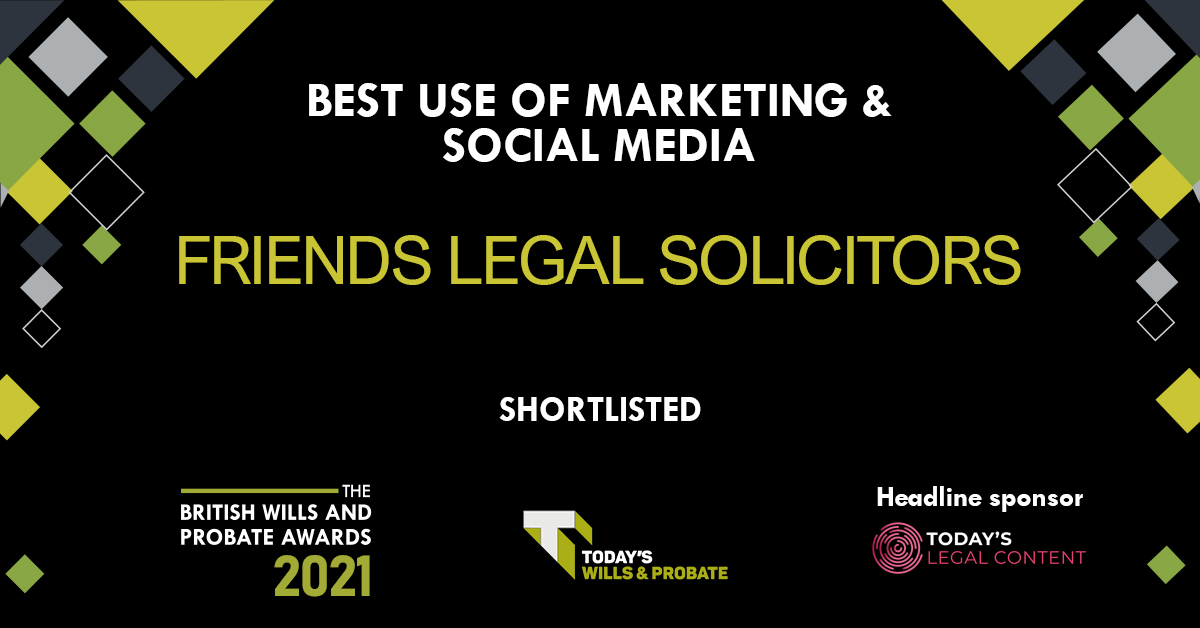Friends Legal are on your side to protect those closest to you, even if you’re not around to do it yourself. We help take away the worry of securing your loved ones future with our expertly crafted Wills and Trusts, part of our By Your Side service. Get in touch today to discuss your legacy with our team of friendly solicitors on 0333 3580 583.
What is a Trust?
A Trust is a way of managing your assets either while you are alive, or after death. Trusts are often used to protect assets and assist vulnerable beneficiaries, and as such are commonly set up in Wills so that assets left to children, for instance, are properly managed while they are too young to do so themselves.
Trusts are also commonly used following an award of damages in a personal injury claim, to ensure that the money allocated to future losses is protected.
A Trust involves three groups of people:
- The “Truster” – this is the person who is setting up the Trust;
- The “Trustees”- these are the people who are responsible for administering the Trust for the benefit of the Beneficiaries;
- The “Beneficiaries” – these are the people who are entitled to benefit from the Trust.
An individual can be in more than one group within the Trust. For example, a person could set up a Trust and also be appointed as a Trustee.
Once the Trust has been set up, assets can be transferred into the Trust. These assets are then held by the Trustees, who administer the Trust for the benefit of the Beneficiaries.
A Trust can be set up during the Truster’s lifetime or set up after death (e.g. in a Will).
Our Services
It will always be necessary to consider your circumstances to determine the most appropriate type of Trust. This will be done when we consider what type of Will you need to properly protect you and your family. However, we can also provide advice in relation to setting up trusts during your lifetime.
Types of Trust
Bare Trust
A Bare Trust is where there are no Trust purposes except for the Trustees to hold the funds for the benefit of the Beneficiary. The funds held in a Bare Trust are usually taxed as if the Beneficiary holds the funds and forms part of the Beneficiary’s estate when they die. So long as the Beneficiary is over 16 and has capacity, they can insist that the Trustees pay the Trust funds to them at any time.
Discretionary Trust
In a Discretionary Trust, the Trustees are given an element of discretion regarding the extent to which Beneficiaries will benefit. For example, the Truster can name a “class” of beneficiaries (such as “my children”) but allow the Trustees the ability to select which members of that class shall inherit, how much they receive, and when they receive it.
Liferent Trusts
This is commonly used in relation to property. It provides someone with the right to occupy the property for a period of time – typically until that individual dies or formally gives up the occupancy. This person is known as the “liferenter”. The liferenter does not own the property- they simply have the right to occupy it. The Beneficiary will be the person who owns the property when the liferent ends. For example, a Liferent Trust could be set up allowing a spouse to continue to reside in the property, and when this occupancy comes to an end, the children become the property owners.
This can be useful for couples concerned about mitigating potential care home costs in the future.
Personal Injury Trusts
A Personal Injury Trust is technically not a separate type of Trust. It is commonly a Bare or Discretionary Trust, but the Trust funds consist of only compensations funds from a personal injury claim. It is essential that only funds received from a personal injury claim are placed in this Trust, as “mixing” funds can render it ineffective.
A Personal Injury Trust can be beneficial as the funds held within can be disregarded in assessing the Beneficiary’s entitlement to means-tested benefits or care contributions. There are time limits for getting a Personal Injury put in place, therefore we would recommend that you contact us as soon as possible if you consider that this might be appropriate for you.
The difference is clear, every step of the way
We offer transparent and fair pricing with no hidden fees. Our accessible, friendly team of experts are passionate about working alongside you through every stage of life’s journey.
Price for Setting Up A Trust
| Single Bare Trust | £900 |
| Couple Single Bare Trust | £1700 |
Trust Administration Prices
| For Bare Trusts | £100 per month |
Contact Us
For more information about our Trusts service, or any of our By Your Side products, please contact our team, who will take your initial details and recommend the best product for you and your loved ones. We provide a wide variety of ways to contact the team, and our opening hours span more than the usual 9-5 – so you can get in touch at a time and in a way that suits you.



